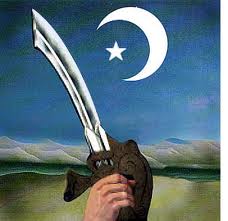 “There is no compulsion in religion” — Qur’an 2:256
“There is no compulsion in religion” — Qur’an 2:256
So that means that the Muslims who pressured these Hindus are Misunderstanders of Islam, right? Not necessarily. The dhimma, after all, mandates discrimination against the “protected” or “guilty” people, the dhimmis. If dhimmis wish to escape the crushing tax burden and the other deprivations of dhimmitude, all they need to do is convert to Islam. If a dhimmi did convert under such circumstances, Islamic law would not regard his conversion as compelled or coerced. When the Muslims in the story below stopped eating food prepared by Hindus, they were simply acting in accord with the Qur’an’s labeling of polytheists as “unclean” (9:28). If a Hindu, seeing his business fall off drastically, then converted to Islam to avoid financial ruin, such a conversion would not be regarded as forced at all — at least by the convert’s new Muslim brethren. They would regard the suffering the convert experienced as a Hindu merely as the natural consequence of his rebellion against Allah and Muhammad, and his conversion as a free response to those consequences.
“57 Pakistani Hindus convert to Islam ‘under pressure,'” by Amir Mir for DNA, May 28 (thanks to Dolmance):
Over 50 Pakistani Hindus have converted to Islam in the Sialkot district of Punjab within a week (between May 14 and May 19) under pressure from their Muslim employers in a bid to retain their jobs and survive in the Muslim-dominated society.
As many as 35 Hindus converted to Islam on May 14, another 14 on May 17 and eight on May 19, 2010.
All the 57 Hindus who have converted belong to the Pasroor town of Sialkot.
According to some Pakistani electronic media reports, Mangut Ram, a close relative of some of the new converts, who lives in Sialkot, said that these Hindus had to embrace Islam because they were under pressure from their Muslim employers.
He said four Hindu brothers along with their families lived in the village of Nikki Pindi. Mangut Ram said that Hans Raj, Kans Raj, Meena/Kartar and Sardari Lal along with his nephews and sons worked at an eatery in Karachi.
According to Mangut Ram, his co workers often used to speak against Hindus in Karachi where his family worked. “The owner of the shop where I worked said that after a few months of his employing me the sales dropped drastically because people avoided purchasing and eating edibles prepared by Hindus. Many people opposed the large presence of Hindu employees at his shop and my boss felt pressured to change the situation,” he added.
Ram said Sardari Lal and his brother Meena/Kartar had worked at the sweets shops for several years and made a decent living that allowed them to support their families.
He said other Muslims employees of the nearby shops discriminated against them and persecuted them. The shop owner was forced to think about their future at his establishment. “That was when the two brothers and their families decided to embrace Islam in order to keep their jobs and be secure,” he added.
Ram confirmed that 13 family members of Sardari Lal, 12 members of Meena/ Kartar, their nephew Kans Raj’s son Boota Ram along with three adults and several children of these families embraced Islam on May 14, 2010.
He said that Sardari Lal’s older brothers Hans Raj and Kans Raj remained Hindus. Hans Raj too has said that he might consider converting to save his job. He said that life was ‘just easier if one was Muslim’ and he wouldn’t be discriminated against.
Ram said that 14 Hindus of the Tapiala village had embraced Islam on May 17 because they were extremely poor and could not get jobs because no one would employ the large Hindu family.
He said that another relative of his, Parkash, who lived in the village of Seowal, along with his eight family members had embraced Islam in order to save their lands.
“After embracing Islam, Parkash Ram told me that Muslim neighbours had been mistreating him and had forced him to convert,” PLEDGE OF JUDGE
Justice Rana Bhagwan Das might be the first Hindu judge to take over as the Acting Chief Justice of the Pakistan Supreme Court, but took oath with a Quranic prayer as stipulated by a rule introduced by late military ruler Zia-ul-Haq.
Justice Das, who is an expert in Islamic law, but has remained devout Hindu took the oath reciting “Bismillah, (in the name of Allah the most beneficent and most merciful”, local daily The News reported.
He took a similar oath when he became the judge of Sindh High Court and later Supreme Court.
The text of oath incorporating a Quranic prayer “may Allah Almighty help and guide me, A’meen) was introduced by Zia in the 1973 constitution through a special Presidential order in 1985 and has been in vogue ever since.
Justice Das’s appointment has hit the headlines all over the world as the Hindu judge was made ACJ on his return from a pilgrimage from India by virtue of being the senior most judge of the apex court.
The government is also hopeful that the appointment of Justice Das who has the reputation of being the most honest and straightforward judge would help contain the massive protests that erupted following suspension and subsequent manhandling of Supreme Court Chief Justice, Iftikar M Chaudhry.
By virtue of becoming ACJ, Justice Das also heads the Supreme Judicial Council (SJC) which conducted the trial against Chaudhry. The trial resumes on April 3.


